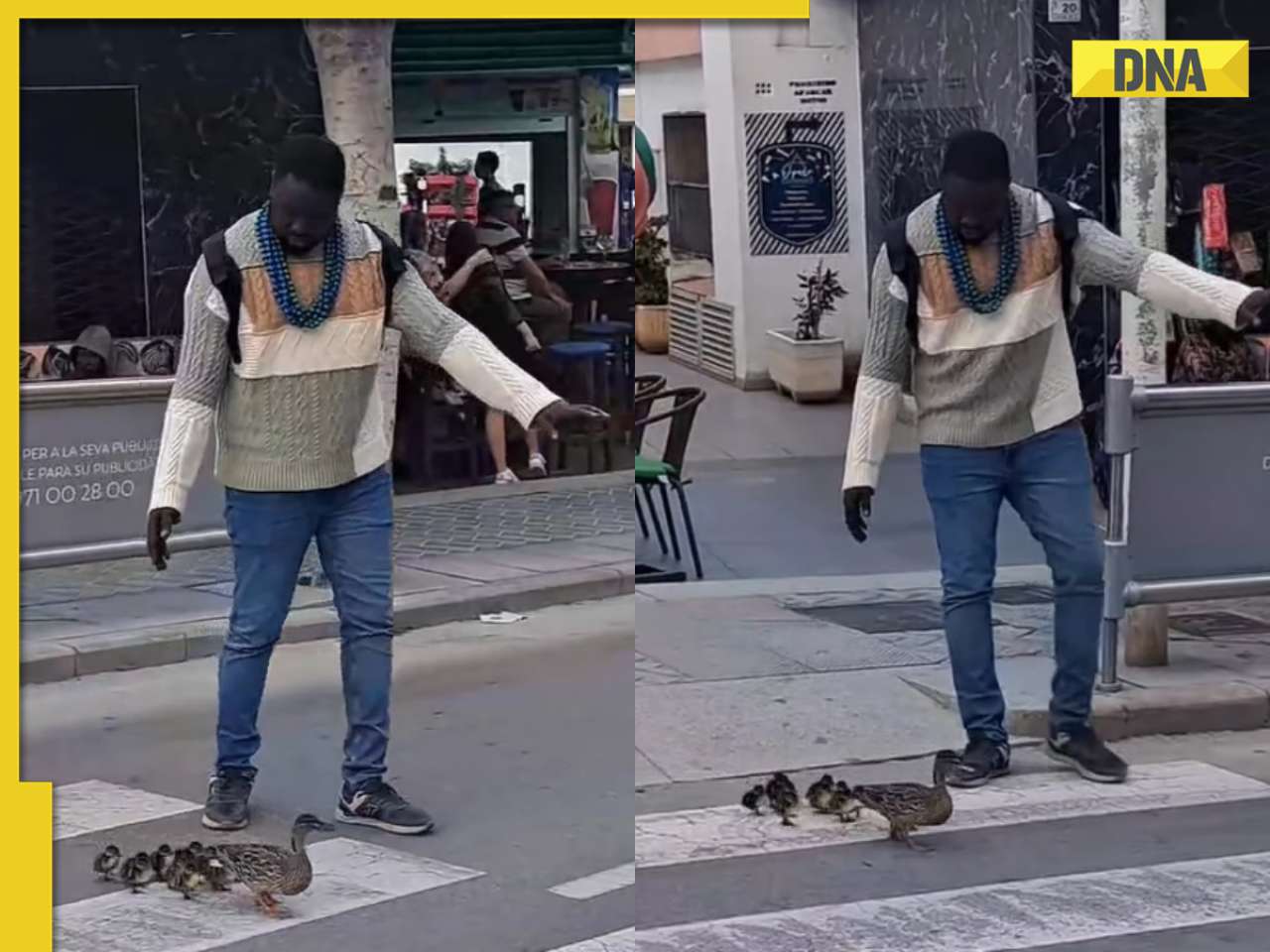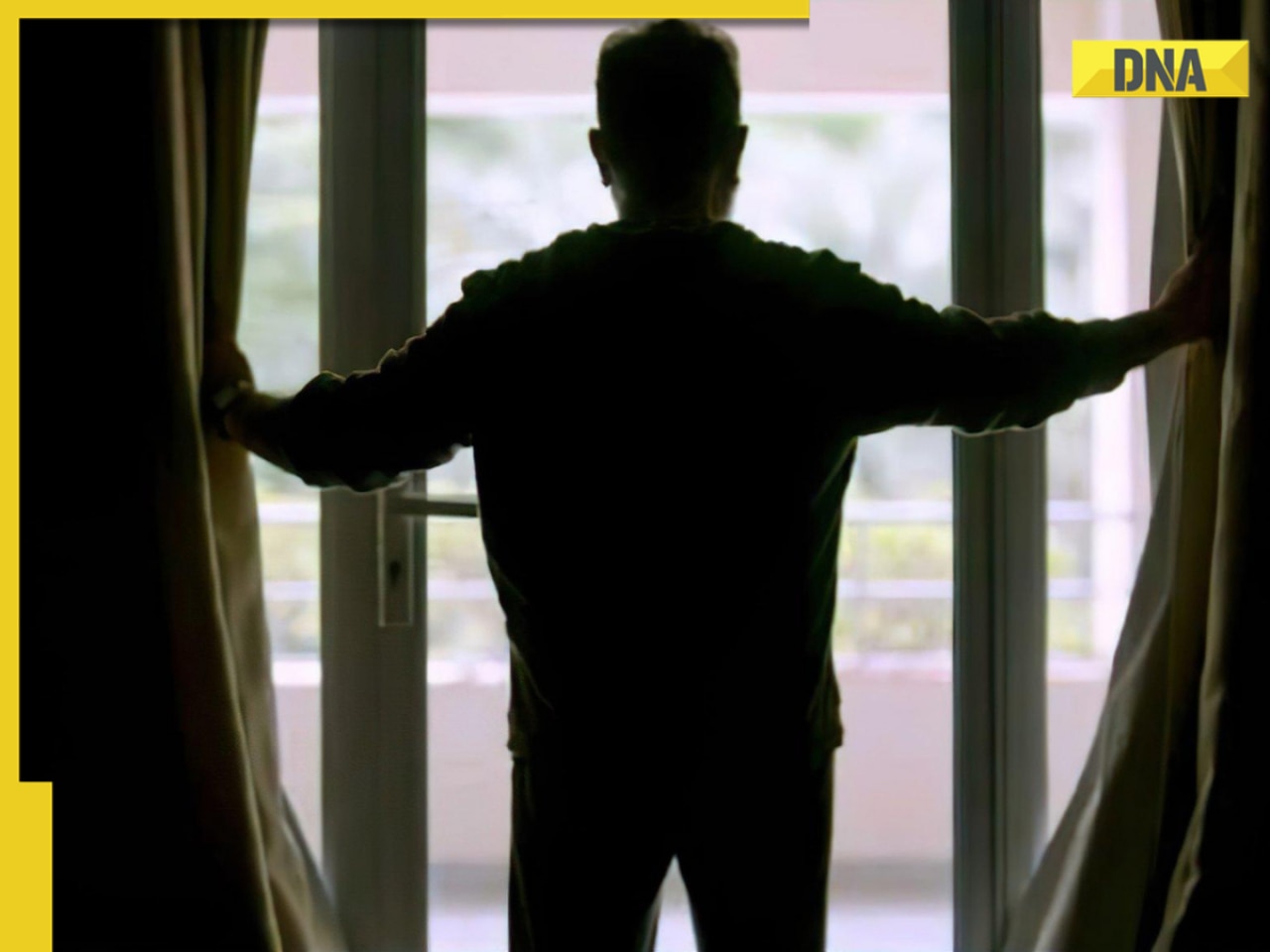He's a man on a mission to save Mumbai's birds and give them shelter till they take wing again. Ornella D'Souza meets Pradeep D'Souza, the city's very own birdman, for lessons on how to save avian life
Pradeep D'Souza has spent every day of the last 25 years healing birds. Giving refuge to all kinds of birds from parrots and sparrows to bats and kites, the 'birdman' is reticent, soft-spoken and appears as gentle as a dove.
D'Souza lives with his family on the fourth floor of the century-old Queen's Mansion in Fort. The family occupies six rooms, sharing a communal terrace with occupants of the other 22 rooms. A narrow, spiral staircase leads to their home. Another climb and a crouch to the loft via a steep flight of stairs aided by a rope leads to the bird shelter. Open the door, and it's a riot of flapping wings, chirps and tweets of all tonal densities.
Birds of the same feather are kept in a common cage. Several brown pariah kites appear to enjoy the wind that occasionally carries them off their claws, the furry, unblinking bats hang upside down, cloaked in their black wings. The grey night herons take short steps and inspect you with bloodshot eyes while the barn owls catch 40 winks and the crows scavenge every bit of leftover morsels. The parakeets dart up and down, the cuckoos and egrets doze off. Smaller birds — sparrows, lovebirds, parrots and mynahs — have made D'Souza's brother Donald's home, their abode.
The birds are either sick or injured, and D'Souza is their caretaker. The 41-year-old wakes up at 4.30am for a walk. He then visits the market for bird feed — an eclectic spread, given the diversity on his terrace. Pigeons, for instance, prefer jowar and bajra, parrots like seeds, while bats relish fresh apples, bananas and papayas. A local gathers chicken heads from butchers for the owls, egrets and kites. By about 9am, D'Souza feeds the hungry mouths and proceeds to clean the cages. "I water the droppings so they turn soft and are easy to scrape off. That's about 15kg of bird droppings daily," he says. During the day, he checks the cages and baskets he's stationed in the area — at the tank, two neighbouring temples and the foot of the building staircase — to see if locals have left behind injured birds.
His love for bird and animal life began when his family adopted five stray dogs. He was 16 then. Within a year, he had turned vegetarian and started to volunteer at Welfare of Stray Dogs (WSD). He realised on the field that not enough was being done for sick, wounded and dying birds. So he decided to educate himself. He read every book at the KEM hospital library on poultry to diagnose symptoms, deworm and administer multi-vitamins. He knows about the diseases that affect different bird species: among pigeons, it's the Newcastle virus that causes paralysis and blindness, while kites suffer from worms, anaemia and mouth ulcers. D'Souza is also adept at making birdcages. It takes him three days and Rs1,000 (opposed to a readymade one for Rs4,500).
Birds, D'Souza says, are worst hit during Sankranti. Stitching their torn and bleeding wings puts the bird in further shock and pain. "You know instantly if a bird will live or die. Yet vets prolong their treatment with steroids and antibiotics." Birds also die from overfeeding, adds D'Souza, annoyed with the altruistic who assume they are doing a good deed by feeding them. "Birds are hunters. They can fly 5km daily for food. But because people started feeding them, they don't get that exercise. Along with grain, metal and soil used to be part of pigeon's diet as these are sources of vitamin B12. But they no longer get these."
He also talks about the dangers of keeping out a large water bowl for thirsting avians. "The entire bowl gets infected when a diseased bird drinks from it, infecting healthy birds who drink from it next." The solution: "Keep 10-12 small containers to reduce the possibility of infection."
The limited cures for avian ailments is a matter of concern. Unless it's a case of diarrhoea, open fractures and bacterial infection, 90 per cent of birds brought to the shelter die of their injuries and diseases. Of the five bats currently housed there, four will never fly again because their wings have been charred in places by firecrackers. The challenges are aplenty. No one wants to nurture handicapped birds. And the law disapproves of kites and owls as pets. Continuous appeals to trusts and religious bodies for land, about 650sqft, have yielded no result. And the Central Zoo Authority is yet to recognise his setup as a legal shelter. "To run a trust, I've to show a balance of Rs3-4 crore in the bank and have a team of doctors and labour," says the one-man army.
D'Souza's journey has not been without setbacks. A decade ago, municipal authorities tried to break his bird cages, but local politicians and religious groups, aware of his good work, intervened. In April 2014, the forest department, acting on his neighbour's complaint, raided and seized 190 birds they termed in need of urgent care. The police took the birds to the Parel hospital of the Bombay Society for Prevention of Cruelty to Animals, where incidentally, they were all pronounced healthy. Yet, D'Souza never saw the birds again.
Seeing so many birds die has led to a certain degree of detachment, but his love for birds continues undiminished. So what keeps him motivated? "My mom and family, they keep me going," says D'Souza. "They are all involved in taking care of the birds. I am able to do this full time because they support me." One of his seven brothers, Donald, sister-in-law Joanita and niece Vanessa pitch in to manage the shelter. Donald also forks out the about Rs15,000 required for expenses every month. "In fact, the two-foot jungle owl, lovingly called Babush, sits on Joanita's shoulder and kisses her cheek often."
The effort brings its own reward. About 100 owls and kites, nursed back to health and released by D'Souza, swoop to his terrace when it's time to eat, everyday. You can be sure that Pradeep D'Souza won't be shutting shop anytime soon.
![submenu-img]() Viral video: Kind man assists duck family in crossing the road, internet lauds him
Viral video: Kind man assists duck family in crossing the road, internet lauds him![submenu-img]() Can you see the Great Wall of China from space? here's the truth
Can you see the Great Wall of China from space? here's the truth![submenu-img]() Ashutosh Rana breaks silence on his deepfake video supporting a political party: 'I would only be answerable to...'
Ashutosh Rana breaks silence on his deepfake video supporting a political party: 'I would only be answerable to...'![submenu-img]() Meet India's most talented superstar, is actor, dancer, stuntman, singer, lyricist; not Ranbir, Shah Rukh, Aamir, Salman
Meet India's most talented superstar, is actor, dancer, stuntman, singer, lyricist; not Ranbir, Shah Rukh, Aamir, Salman![submenu-img]() This flop film was headlined by star kid, marked south actress's Bollywood debut, made in Rs 120 crore, earned just...
This flop film was headlined by star kid, marked south actress's Bollywood debut, made in Rs 120 crore, earned just...![submenu-img]() DNA Verified: Is CAA an anti-Muslim law? Centre terms news report as 'misleading'
DNA Verified: Is CAA an anti-Muslim law? Centre terms news report as 'misleading'![submenu-img]() DNA Verified: Lok Sabha Elections 2024 to be held on April 19? Know truth behind viral message
DNA Verified: Lok Sabha Elections 2024 to be held on April 19? Know truth behind viral message![submenu-img]() DNA Verified: Modi govt giving students free laptops under 'One Student One Laptop' scheme? Know truth here
DNA Verified: Modi govt giving students free laptops under 'One Student One Laptop' scheme? Know truth here![submenu-img]() DNA Verified: Shah Rukh Khan denies reports of his role in release of India's naval officers from Qatar
DNA Verified: Shah Rukh Khan denies reports of his role in release of India's naval officers from Qatar![submenu-img]() DNA Verified: Is govt providing Rs 1.6 lakh benefit to girls under PM Ladli Laxmi Yojana? Know truth
DNA Verified: Is govt providing Rs 1.6 lakh benefit to girls under PM Ladli Laxmi Yojana? Know truth![submenu-img]() Aamir Khan, Naseeruddin Shah, Sonali Bendre celebrate 25 years of Sarfarosh, attend film's special screening
Aamir Khan, Naseeruddin Shah, Sonali Bendre celebrate 25 years of Sarfarosh, attend film's special screening![submenu-img]() Alia Bhatt wears elegant saree made by 163 people over 1965 hours to Met Gala 2024, fans call her ‘princess Jasmine’
Alia Bhatt wears elegant saree made by 163 people over 1965 hours to Met Gala 2024, fans call her ‘princess Jasmine’![submenu-img]() Jr NTR-Lakshmi Pranathi's 13th wedding anniversary: Here's how strangers became soulmates
Jr NTR-Lakshmi Pranathi's 13th wedding anniversary: Here's how strangers became soulmates![submenu-img]() Streaming This Week: Heeramandi, Shaitaan, Manjummel Boys, latest OTT releases to binge-watch
Streaming This Week: Heeramandi, Shaitaan, Manjummel Boys, latest OTT releases to binge-watch![submenu-img]() Remember Ayesha Kapur? Michelle from Black, here's how actress, nutrition coach, entrepreneur looks after 19 years
Remember Ayesha Kapur? Michelle from Black, here's how actress, nutrition coach, entrepreneur looks after 19 years![submenu-img]() Haryana Political Crisis: Will 3 independent MLAs support withdrawal impact the present Nayab Saini led-BJP government?
Haryana Political Crisis: Will 3 independent MLAs support withdrawal impact the present Nayab Saini led-BJP government?![submenu-img]() DNA Explainer: Why Harvey Weinstein's rape conviction was overturned, will beleaguered Hollywood mogul get out of jail?
DNA Explainer: Why Harvey Weinstein's rape conviction was overturned, will beleaguered Hollywood mogul get out of jail?![submenu-img]() What is inheritance tax?
What is inheritance tax?![submenu-img]() DNA Explainer: What is cloud seeding which is blamed for wreaking havoc in Dubai?
DNA Explainer: What is cloud seeding which is blamed for wreaking havoc in Dubai?![submenu-img]() DNA Explainer: What is Israel's Arrow-3 defence system used to intercept Iran's missile attack?
DNA Explainer: What is Israel's Arrow-3 defence system used to intercept Iran's missile attack?![submenu-img]() Ashutosh Rana breaks silence on his deepfake video supporting a political party: 'I would only be answerable to...'
Ashutosh Rana breaks silence on his deepfake video supporting a political party: 'I would only be answerable to...'![submenu-img]() Meet India's most talented superstar, is actor, dancer, stuntman, singer, lyricist; not Ranbir, Shah Rukh, Aamir, Salman
Meet India's most talented superstar, is actor, dancer, stuntman, singer, lyricist; not Ranbir, Shah Rukh, Aamir, Salman![submenu-img]() This flop film was headlined by star kid, marked south actress's Bollywood debut, made in Rs 120 crore, earned just...
This flop film was headlined by star kid, marked south actress's Bollywood debut, made in Rs 120 crore, earned just...![submenu-img]() India's most successful star kid was superstar at 14, daughter of tawaif, affair with married star broke her, died at...
India's most successful star kid was superstar at 14, daughter of tawaif, affair with married star broke her, died at...![submenu-img]() India's biggest flop actor, worked with superstars, married girl half his age, once left Aamir's film midway due to..
India's biggest flop actor, worked with superstars, married girl half his age, once left Aamir's film midway due to..![submenu-img]() England pace legend James Anderson set to retire from Test cricket after talks with Brendon McCullum
England pace legend James Anderson set to retire from Test cricket after talks with Brendon McCullum![submenu-img]() IPL 2024: Shubman Gill, Sai Sudharsan centuries guide Gujarat Titans to 35-run win over Chennai Super Kings
IPL 2024: Shubman Gill, Sai Sudharsan centuries guide Gujarat Titans to 35-run win over Chennai Super Kings![submenu-img]() KKR vs MI IPL 2024: Predicted playing XI, live streaming details, weather and pitch report
KKR vs MI IPL 2024: Predicted playing XI, live streaming details, weather and pitch report![submenu-img]() 'It's ego-driven...': Ex-RCB star on Hardik Pandya's captaincy in IPL 2024
'It's ego-driven...': Ex-RCB star on Hardik Pandya's captaincy in IPL 2024![submenu-img]() BCCI to advertise for Team India's new head coach after T20 World Cup
BCCI to advertise for Team India's new head coach after T20 World Cup![submenu-img]() Viral video: Kind man assists duck family in crossing the road, internet lauds him
Viral video: Kind man assists duck family in crossing the road, internet lauds him![submenu-img]() Can you see the Great Wall of China from space? here's the truth
Can you see the Great Wall of China from space? here's the truth![submenu-img]() Mother bear teaches cubs how to cross a road with caution, video goes viral
Mother bear teaches cubs how to cross a road with caution, video goes viral![submenu-img]() Meet the tawaif, real courtesan of Heeramandi, was once highest paid item girl, was killed by....
Meet the tawaif, real courtesan of Heeramandi, was once highest paid item girl, was killed by....![submenu-img]() Mukesh Ambani’s old image with billionaire friends go viral, Harsh Goenka makes joke of…
Mukesh Ambani’s old image with billionaire friends go viral, Harsh Goenka makes joke of…




































)


















)
)
)
)
)
)